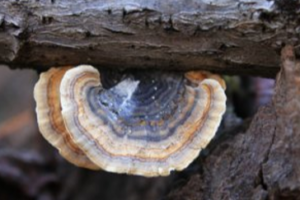Blog
Wonder Mushroom: The Top 10 Health Benefits of Turkey Tail Mushroom
Medicinal mushrooms have been used for thousands of years to promote health and longevity.
And one of the true “superstars” among the stars when it comes to mushrooms is turkey tail mushroom.
This amazing mushroom is one of the most studied varieties and has some very impressive benefits for your physical wellness and your skin.
Turkey tail can enhance immune function, ward off and help eliminate signs of skin aging, and much more, as you’re about to discover…
Functional Mushrooms for Longevity and Balance
As a food, mushrooms usually evoke a strong feeling in people. There’s something about the texture and taste that often calls up a love-it or hate-it reaction.
Regardless of whether you enjoy or avoid mushrooms, though, you may want to take a second look at them as health-promoting super-fungi.
(And YES, you can use them as a supplement without ever tasting them, and as you’ll see you can also feed them directly to your skin!)
Functional mushrooms (also frequently called medicinal mushrooms) have been used for a long time in Eastern medicine. This includes traditional Chinese medicine where they are considered valuable adaptogenic herbs.
The term ‘adaptogen’ or ‘adaptogenic’ means a natural substance that helps restore balance to the body. Most adaptogens encourage a better stress response (both physically and mentally) and help normalize hormones. Studies have also shown they can have a positive effect on your entire central nervous system and have anti-fatigue properties.
The Amazing Turkey Tail
Turkey tail (Trametes versicolor or Coriolus versicolor) is a specific type of functional mushroom. It’s known in Chinese medicine as Yun Zhi and in Japan as kawaritake (cloud mushroom).
This distinct mushroom grows in many parts of the world, including Asia, North America, and Europe. You’re most likely to find them growing in wet, shady areas of temperate forests. They can appear on dead logs, stumps, and live trees and have a fan-shaped appearance and coloring not unlike a turkey tail.
Of course, there are adaptogenic benefits of turkey tail mushroom, just like other functional mushrooms. They are valued in many Asian cultures for longevity and health and are thought to symbolize spiritual attunement and infinity.
In traditional Chinese medicine specifically, turkey tail is often brewed into a tea and used to clear dampness, increase qi (energy), and strengthen the spleen, stomach, and lungs. It’s believed to have been used since at least 200 A.D. and probably longer!
Modern research has found that turkey tail mushroom is filled with powerful compounds that confirm many of its traditional uses and also indicate new, exciting areas of potential.
Outstanding Health Benefits of Turkey Tail Mushroom
Loaded with Antioxidants
Eating foods high in antioxidants is key to healthy aging. It keeps your body’s antioxidant defense system working full force to protect you from oxidative stress. This is very important because oxidative stress can lead to inflammation, accelerated aging, and even chronic disease.
Though they aren’t green or brightly colored, mushrooms are nevertheless an excellent source of antioxidants — and turkey tail is no exception. In fact, turkey tail is known to have some particularly powerful antioxidants.
The main antioxidant groups in turkey tail are phenols and flavonoids. Both of these groups have documented benefits for reducing inflammation, boosting immune function, and providing protection against cancer, heart disease, and neurodegenerative diseases.
Turkey tail mushroom also has a specific antioxidant known as quercetin. Quercetin is very well studied and has anti-allergy and pain-relieving potential.
Strongly Supports Your Immune System
Most functional mushrooms, including turkey tail, contain immune-boosting polysaccharides known as beta glucans. Not only do beta glucans have a stimulating effect on immune cells, they have also been found to protect against infection by bacteria, viruses, and other pathogens.
This in itself would be impressive, but there are even more benefits of turkey tail mushroom for immune support.
Turkey tail contains two other notable polysaccharides: polysaccharide Krestin (PSK) and polysaccharopeptide (PSP). Both of these polysaccharides possess strong immune-enhancing properties. PSP, in particular, can boost a certain type of white blood cell that fights infections.
It is important to note, however, that there’s no evidence turkey tail would overstimulate your immune system. Remember, it’s an adaptogen that works to enhance immunity without disturbing your body’s natural balance.
Has Shown Powerful Anticancer Potential
The same compounds in turkey tail mushroom that boost immune function — PSP and PSK — have also shown cancer-fighting potential. Part of the reason for this is that they enhance immune response, which may help slow the growth of cancer cells and tumors.
PSK has also specifically shown an ability in lab studies to inhibit the growth of human colon cancer cells. Similarly, PSP may be able to help stop colon cancer cells from invading healthy cells.
Still, the most promising aspect of turkey tail for cancer is that it boosts immune function to help the body recognize and fight off cancer. It isn’t a cure, but research on this mushroom and cancer is much more advanced than many other promising discoveries.
In fact, it even has the potential to enhance conventional cancer treatments…
May Boost Conventional Cancer Treatments
Perhaps one of the most significant benefits of turkey tail mushroom is its potential to enhance cancer treatment.
Though no treatments are approved in the U.S. by the FDA, PSK (isolated from turkey tail) is currently an approved adjuvant cancer treatment in Japan.
There is good basis for this from what research has so far shown. For example, a review of several studies on stomach cancer found that those who took PSK alongside chemotherapy lived longer than those who didn’t. Other studies have had similar results, with the cancer patients combining PSK and chemotherapy surviving longer.
One very small study involving women with breast cancer even suggested that turkey tail supplementation increased cancer-fighting cell activity.
These results are nothing short of incredible, and hopefully more advances will be made as research continues.
Good for Gut Health (and May Fight Obesity)
One of the best ways to keep your digestion healthy is to nourish your gut with beneficial bacteria. Probiotics are, of course, a big part of this but so are prebiotics — substances that feed good bacteria and keep them thriving.
Turkey tail mushroom is an excellent source of prebiotics.
PSP, in particular, acts as a prebiotic as well as an immune-enhancer and may help with gut recovery after antibiotic use. Some studies have shown that it can even increase populations of beneficial bacteria (like Lactobacillus) and reduce potentially harmful strains like Staphylococcus and Clostridium.
This is outstanding for your digestion as a whole, but the benefits of turkey tail mushroom don’t stop there.
One study found that the protein-bound beta glucan (PBG) in turkey tail may have an anti-obesity effect. Human studies are still needed to confirm this, but it may be able to help prevent weight gain, in part by improving the gut microbiome. Very impressive!
Antiviral Activity (Particularly Against HPV & HIV)
Turkey tail mushroom has both antibacterial and antiviral power. So far, it has shown the most antiviral promise against human papillomavirus (HPV) — and also some potential against human immunodeficiency virus (HIV).
A 2014 study investigated a combination of turkey tail and another powerful functional mushroom, reishi, against oral HPV. The results were very promising — clearance of HPV was 88% as compared with only 2% in the other group!
In a different study, a formulation of several functional mushrooms, including turkey tail, showed promise for treating a skin cancer related to HIV/AIDS. It was also found beneficial for HIV/AIDS patients who didn’t have the skin cancer.
Research showing that PSP extracted from turkey tail could inhibit HIV replication was part of the reason this formula was created in the first place. It just goes to show how powerful turkey tail and other functional mushrooms can be.
Surprising Skin Benefits of Turkey Tail Mushroom
Combats Signs of Aging
Antioxidants are just as important for keeping your skin looking young as they are for keeping your body feeling young. Free radicals cause oxidative stress in your skin as well as the rest of your body. This accelerates skin aging and can make your skin look prematurely old (wrinkles, dark spots, sagging, etc.).
Fortunately, turkey tail mushroom is packed with antioxidants that help halt this process. Antioxidants also help protect the valuable collagen and elastin in your skin, which means they may keep wrinkles and other signs of aging at bay.
Turkey tail even contains compounds that can minimize the appearance of dark spots!
Protective of Your Skin
Along with fighting existing signs of aging, antioxidants also have a protective effect to help prevent further damage that may accelerate aging even more.
One of the best examples of this is photodamage. This refers to wrinkles, dark spots, uneven texture, etc. that come from overexposure to UV radiation. Photodamage basically speeds up the aging process, making your skin look much older than it should.
Both applying antioxidants topically and consuming them are ways to provide your skin with extra protection against this type of damage.
But wait- there’s more.
One of the specific antioxidants in turkey tail mushroom, quercetin, has demonstrated a restorative effect on human dermal fibroblasts (HDFs). These are cells involved in the secretion of both collagen and elastin- the two very important skin proteins that help prevent signs of aging!
Reduces the Appearance of Puffiness
The quercetin found in turkey tail mushroom has benefits for reducing overall inflammation in your body. It also supports keeping skin inflammation at a healthy level, which means it can reduce the look of puffy skin, particularly under your eyes.
This anti-inflammatory action can even reduce the appearance of redness and may prove useful in the future for calming inflammatory skin issues. In fact, there’s some evidence that quercetin has an anti-itch effect and may help restore skin barrier function. This would make it very helpful for damaged or irritated skin.
Nourishing and Rejuvenating
Overall, turkey tail mushroom is very nourishing for your skin. With its impressive array of antioxidants and other compounds, it “feeds” your skin the right stuff and has a rejuvenating effect on your complexion.
While there is no skin type turkey tail isn’t good for, it can be especially beneficial if you have a dry, damaged, or aging complexion. These particular skin types typically need to “catch up” on nutrients and antioxidants to feel fresh and restored.
Best Ways to Use Turkey Tail Mushroom
Turkey tail mushroom can be eaten, but it has a chewy texture that makes it unappealing to most people. Also, it’s challenging to get enough of the beneficial compounds (PSK, PSP, beta glucans, etc.) if you eat it whole.
To concentrate the benefits of turkey tail mushroom, it’s usually taken as a tea or extract.
The tea is made by either steeping or simmering the chopped mushrooms in hot water. It will have a definite savory flavor and is really more like a broth than a tea. Turkey tail extract is available as a liquid, capsules, and powder.
Meanwhile, it is also available in supplement form. When choosing a turkey tail supplement, it’s very important to look for two things: organic and made from the fruiting body.
You want to choose organic because mushrooms can easily become contaminated with chemicals that may ruin their beneficial effects. Also, choosing a supplement made from the fruiting body means you are getting the actual mushroom — not merely the inferior mycelium (root system) that some companies will sell you.
Of course, another great way to use turkey tail is in your skincare routine…


